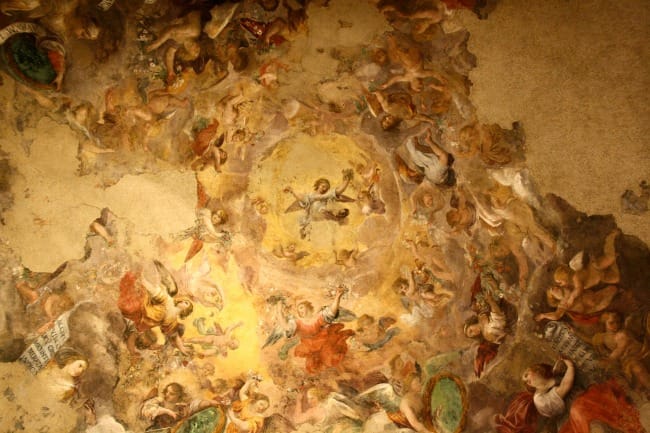I have had the privilege of praying with people in hospice, watching over the newly deceased, and presiding at the funerals of the young and the old. In moments like these, it is common for people to ask life's ultimate questions: What happens when we die? Where are we all going? Is there a purpose to life and death, a movement towards some ultimate meaning or final destination? How we answer these questions not only shapes our understanding of the future, it also profoundly shapes how we live in the present. For many followers of Jesus, the ultimate answer to these questions is heaven - but it shouldn't be.

Heaven Is a Problem
Heaven has had a grip on the Western imagination for centuries, from Renaissance frescoes depicting chubby angels floating through an ethereal sky with harps in their hands to the contemporary television series that depicts the afterlife as “The Good Place,” a utopia offering unlimited wish fulfillment for those who were morally virtuous in life (although this turns out to be not so heavenly).
Heaven has, of course, had an even stronger hold upon the Christian imagination. I remember hearing the evangelist Billy Graham invite people to consider the fleeting nature of life by declaring, “You could be in heaven by midnight tonight.” His point was to spur people to “get right with God” so that, should their life end unexpectedly, they would be assured of a place in heaven. During Graham’s 50-year ministry, millions responded to this invitation from all denominations and walks of life. For many Christians, to question this emphasis on a future in heaven is unheard of, and might be considered heretical. But what if heaven is not the final destination we have made it out to be? What if we have been investing our hope in the wrong place and living our lives in the wrong direction? What if the ultimate destination for life is right under our feet?
Why I Don't Worry About Going to Heaven
From a biblical perspective, the "heavens" consist of everything in creation that is not Earth (see Genesis 1:1). Biblical imagery pictures these "heavens" as God's primary abiding place within creation. The assumption of most Christians has been that God's goal for humanity is to move us, eventually, from this temporary, imperfect earth to God's permanent, perfect heaven. The biblical story, however, tells us that the exact opposite is true – God’s goal is to bring the heavens and earth together in a unified creation full of the divine presence. This was true in the Garden of Eden, where God walked with Adam and Eve until their disobedience created rifts in the relationships between God and humanity, and between humanity and the rest of creation. The result was a distinct separateness within creation rather than a growing unity. God’s work of salvation is about healing these separations so that heaven and earth can be united and the whole community of creation can come into full relationship with the Creator.
There are biblical scholars and theologians who are helping us shift our thinking in this direction. They describe salvation as a healed creation, or an ecotopia in which all creation flourishes in a world no longer bound by sin, death, and evil. They point out that the Bible speaks a lot about God coming to earth, and not much about us going to heaven. Scholar N.T. Wright points out that, yes, we “go to heaven” when we die, but this only means that we continue to exist in some way by God’s grace and power. But whatever and wherever that is, it is not our final destination, which Wright refers to as “life after life after death.”
This is a strange phrase, but I think it begins to make sense when we see that Jesus is the ultimate expression of a unified creation, the revealer of what “life after life after death” looks like. His very birth brings heaven and earth together in a human body – what Christians call the incarnation. His life and teaching clearly revealed that the flow of God’s presence and purpose was towards the earth, not away from it. This is why he taught us to pray, “Your kingdom come, your will be done, on earth as it is in the heavens." Finally, his death and resurrection points to the ultimate unification of heaven and earth, spirit and matter. As one scholar puts it,
It is absurd to think that Jesus died and rose again to save our souls – not our bodies and the whole creation. Why should Jesus rise physically to save us only spiritually? Do we really believe in resurrection – resurrection in space, time, and history? If so, how can we not believe in creation healed in space, time, and history?
The Bible ends with evocative images of this resurrection life in a new heaven and a new earth (see Revelation 21 and 22), which is not a replacement of the old creation but the renewal that happens when God’s presence comes to dwell with us permanently. When will this happen and what it will be like? No one knows. But we have been given enough to stoke our imagination and to orient our lives in the right direction. That is why I don’t worry about going to heaven; I'm focused on the ways in which heaven – God's abiding presence and purpose – is coming to earth.
Why This Matters
If our destination is a distant, earthless heaven, then what happens on this earth and to this earth doesn’t seem to matter as much. Why care about poverty, politics, or pollution when it is all "passing away”? Why focus our energy on improving this world when we can help people secure their place in the world to come?
On the other hand, if our destination is a heavenly earth, we begin to see that there is continuity between this world and the one to come, and that how we live now truly matters. We also begin to see that, although the final work of healing is God’s, we are called to participate now through lives that cultivate reconciliation and healing with God, ourselves, each other, and the earth. And in this time of ecological crisis – when life on earth doesn’t seem to be moving in a heavenly direction - this vision of discipleship is crucial.

Living in the Glimpses
Practicing this kind of discipleship can be difficult, especially when the kind of future pictured in the Bible and inaugurated in Jesus only comes to us in glimpses. The first challenge is to slow down enough to catch these glimpses. The more often we do this, the more they seem to come to us. In the words of poet Elizabeth Barrett Browning,
“Earth's crammed with heaven,
And every common bush afire with God,
But only he who sees takes off his shoes;
The rest sit round and pluck blackberries.”
We can also look for such glimpses within us, for God's new creation has already arrived in Jesus, which means it has arrived in us (see 2 Corinthians 5:17)! Think about the moments that God has touched your life, the ways you have changed for the better, the glimpses of a new world that have broken through in your family or community. Remember the moments the Spirit has spoken to you, reassured you, or nudged you toward a fuller life.
All these glimpses of reconciliation and healing – in whatever form they come and however long they last - are signs of God’s new world breaking into the old, and a taste of what is to come. These signs can bring hope to dying bodies, broken communities, and ecosystems of the verge of collapse. They can also call us to do our part in bringing divine reconciliation and healing to the world. When this happens, we become signs for others, glimpses of a world made new, and an answer to that most important question, “Where are we going?”
With you on the Way,
James
Comments or questions? Leave a comment, or email me directly at james.amadon@circlewood.online.